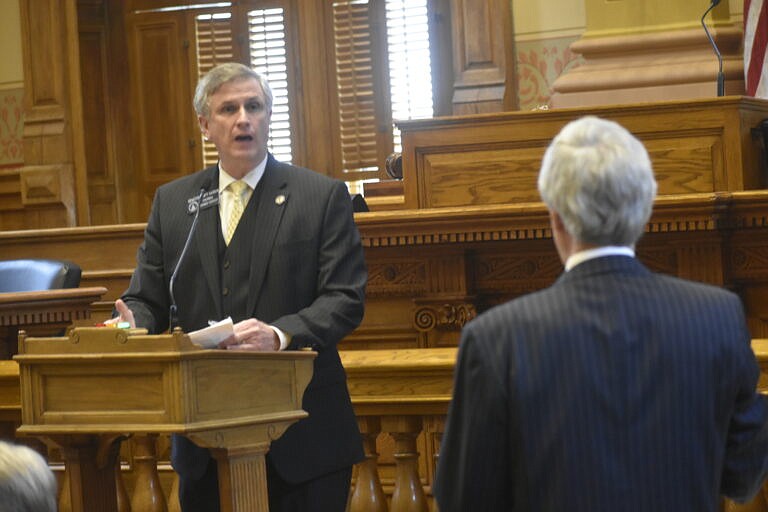The Georgia state Senate struck down a gambling bill Thursday, greatly decreasing the odds that the state will expand legal wagering opportunities this year beyond online sports betting.
Senators voted 37-19 against Sen. Billy Hickman's bill, which would have cleared the way for online sports betting companies to take bets in Georgia and also licensed three tracks across the state for horse racing. Two gambling bills remain in play this session, both limited to online sports betting.
Hickman, a Statesboro Republican, tried to convince his colleagues that expanding gambling under the Georgia Lottery would create jobs for horse breeders and tenders and bring in more state dollars for pre-kindergarten programs and the HOPE Scholarship.
"You've heard the stories about our pre-K not being fully funded. You've heard the stories about our children not attending pre-K. This will be additional money for that, and it also will be additional money for universities," he said.
Hickman said the combined horse track and sports betting business was predicted to bring 8,500 jobs and a $1.1 billion economic impact along with between $250 million and $300 million a year to the Georgia Lottery, which funds pre-K and HOPE.
But other senators said the risks of expanding gambling would outweigh the benefits. Tyrone Republican Sen. Marty Harbin said gambling is a waste of money and ruins lives by causing addiction. He said he was concerned that legitimizing a process that goes on under the table could entice more young people to get hooked.
"There's gambling going on as we speak – there may be gambling going on about this bill, whether it's going to pass or not. I don't know what the odds are, but I can guarantee you they're gambling somewhere," he said.
The debate over the bill became personal when Hickman asked Harbin whether his children accepted the HOPE Scholarship. Harbin said some of them did and some of them didn't.
"So lottery funds helped fund your children's education?" Hickman asked.
"A small part of it," Harbin said.
"Don't you think lottery funds also help fund a lot of your constituents' children's education?" asked Hickman.
"It funds my constituent's education with the lottery that's there," said Harbin. "But I don't believe that more gambling is healthy for our state and for our children."
(READ MORE: States that have wagered the most on sports betting since the ban was lifted in 2018)
Harbin said rather than more gambling, he would prefer to see programs to make it easier for students to work their way through college and to help students who fall behind finish their degrees.
"Do you feel like you have done something wrong to allow your children to accept lottery funds when you're so against gambling?" asked Hickman. "Isn't that like taking money from the gamblers and spending it for your own personal needs? That's what's so hard for me to understand here."
"If it's hard to understand, here's what I will tell you," Harbin said. "I pay a lot of taxes anyhow that go to the state, and I figure this, if I can take the law, I'm going to use it."
"I'm just very disappointed that you're so against gambling, but you were willing to take money from the lottery for your children," Hickman said. "If you were so against it, you should never have taken the money from the lottery."
"Thank you, sir. Appreciate that," answered Harbin.
Senate Appropriations Committee Chairman Blake Tillery, a Vidalia Republican, said he was worried about a change in the bill to the way the lottery's shortfall reserve would be funded.
"If you're for horse racing, against horse racing, I don't care, but we are making a major policy shift in this bill that doesn't address horse racing at all," he said.
The state is required to keep half of the lottery's proceeds from the previous year in a fund to pay for HOPE in case of a shortfall. According to the Georgia Budget and Policy Institute, the reserves stand at $1.9 billion, about $772 million of which is required in case of a shortfall to be able to fund HOPE programs. An additional $1.1 billion is considered unrestricted reserves.
Tillery found fault with lines in the bill that would have required a portion of the unrestricted reserves to be spent on education, something Democrats have supported in recent years.
"Because that's there, I can't vote for this. It's a policy change that I can't support, and I would ask you as you think about this bill to think about those lines as well," he said.
One hope for people who like to wager lies in the hands of Watkinsville Republican Rep. Marcus Wiedower's House Bill 380. If that bill becomes law, the Georgia Lottery will assume control of sports betting in the state, and 16 licenses would become available to operate betting services.
The other gambling bill still alive and kicking heading into Monday's pivotal day for a bill to advance from one chamber to the other is Sen. Bill Cowsert's Senate Bill 172, which would call for a constitutional amendment to allow sports betting in the state. That would require two-thirds majority votes in both chambers and approval from voters.
Both bills have passed out of their committees but have yet to receive votes in their respective chambers.
Monday is Crossover Day, the deadline for bills to move from one chamber to the next without legislative maneuvering.
Read more at GeorgiaRecorder.com.
